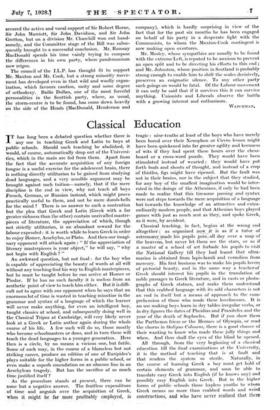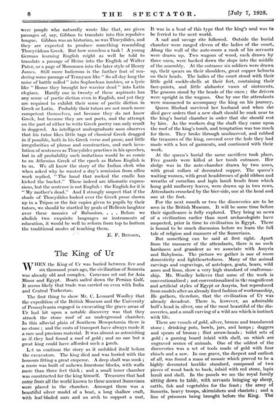Classical Education
IT has long been a debated question whether there is any use in teaching Greek and Latin to boys at public schools. Should such teaching be abolished, it would, of course, automatically drop out of the Universi- ties, which in the main are fed from them. Apart from the fact that the accurate acquisition of any foreign tongue is a useful exercise for the adolescent brain, there is nothing directly utilitarian to be gained from studying dead languages, and a very sensible argument may be brought against such tuition—namely, that if the mere discipline is the end in view, why not teach all boys French, German, or Russian instead, which might prove practically useful to them, and not be mere dumb-bells for the mind ? There is no answer to such a contention but the plea that Greek and Latin (Greek with a far greater richness than the other) contain unrivalled master- pieces of literature, the appreciation of which, though not strictly utilitarian, is an abundant reward for the labour expended : it is worth while to learn Greek in order to enjoy Homer, Aeschylus, or Plato. And then our imagi- nary opponent will attack again : " If the appreciation of literary masterpieces is your object," he will say, " why not begin with English ? "
An awkward question, but not final : for the boy who is capable of appreciating the beauty of words at all will without any teaching find his way to English masterpieces, but he must be taught before he can arrive at Homer or Pindar. If he has no such faculty it is useless from an aesthetic point of view to teach him either. But it is diffi- cult not to agree with our opponent when he says that an enormous lot of time is wasted in teaching minutiae in the grammar and syntax of a language of which the learner will never make anything, for even an intelligent boy, taught classics at school, and subsequently doing well in the Classical Tripos at Cambridge, will very likely never look at a Greek or Latin author again during the whole course of his life. A few such will do so, those mostly who become schoolmasters or dons, and in turn these will teach the dead languages to a younger generation. Here then is a circle, by no means a vicious one, but futile. Some of such may, in the course of a blameless but not striking career, produce an edition of one of Euripides's plays suitable for the higher forms in a public'school, or even make a superb emendation on an obscure line in an Aeschylean tragedy. But has the sacrifice of so much time justified itself ?
As the procedure stands at present, there can be none but a negative answer. The fruitless expenditure of time and anguish over the acquisition of Greek, when it might be far more profitably employed, is tragic : nine-tenths at least of the boys who have merely been bored over their Xenophon or Cicero lesson might have been quickened into far greater agility and keenness of wits if they had spent these hours over the chess- board or a cross-word puzzle. They would have been stimulated instead of wearied ; they would have put forth buds and shoots of thought, and instead of a crop of thistles, figs might have ripened. But the fault was not in their brains, nor in the subject that they studied, for any boy of the smallest imagination would be inter- ested in the doings of the Athenians, if only he had been made to realize that this tiresome parsing and syntax were not steps towards the mere acquisition of a language but towards the knowledge of an attractive and extra- ordinarily modern people, and that Athenian boys played games with just as much zest as they, and spoke Greek, as it were, by accident.
Classical .teaching, in fact, begins at the wrong end altogether as organized • now it is as if a tutor of astronolny, Wade his pupils pore ;all day over a map of the heavens, but never let. them see the stars, or as if a master of a school of art forbade his pupils to visit the National Gallery .till they had learnt that ultra- marine is obtained from lapis-lazuli and vermilion from mercury. His first business was to make his pupils lovers of pictorial beauty, and in the same way a teacher of Greek should interest his pupils in the translation of noble passages in Greek literature, and in casts or photo- graphs of Greek, statues, and make them understand that this crabbed language with its odd characters is not an end in itself but a means of approach to the com- prehension of those who made these lovelinesses. It is no use making boys learn in dry tables irregular verbs, or in dry figures the dates of Pheidias and Praxiteles and the year of the death of Sophocles. But if you show them the Parthenon frieze or the Hermes of Olympia, or read the chorus in Oedipus Coloneus, there is a good chance of their wanting to know who made these jolly things and when. And thus shall the eyes of the blind be opened.
All through, from the very beginning of a classical education till the final examinations at the University, it is the method of teaching that is at fault and that renders the system so sterile. Naturally, in the course of learning Greek a boy must get hold of certain elements of grammar, and soon be able to translate easy Greek into English (if he knows any) and possibly easy English into Greek. But in the higher forms of public schools those hapless youths to whom Greek means no more than crabbed words and weird constructions, and who have never realized that there were people who naturally wrote like that, are given passages of, say, Gibbon to translate into this repulsive tongue. Gibbon was an historian, so was Thucydides, and they are expected to produce something resembling Thucydidean Greek. But how senseless a task ! A young German learning English might as well be told to translate a passage of Heine into the English of Walter Pater, or a page of Mommsen into the later style of Henry James. Still more ludicrous is the further feat of ren- dering some passage of Tennyson like " So all day long the noise of battle rolled " into Sophoclean iambics, or a lyric like " Home they brought her warrior dead " into Latin elegiacs. Hardly one in twenty of these aspirants has any sense of poetic diction even in English, and yet they are required to exhibit their sense of poetic diction in Greek or Latin. Probably their tutors are not much more competent themselves, not because they do not know Greek, but because they are not poets, and the attempt on the part of either to write Greek poetry can only result in doggerel. An intelligent undergraduate soon observes that his tutor likes little tags of classical Greek dragged in if possible, both in his Greek verse and prose, and little irregularities of phrase and construction, and such invo- lution of sentences as Thucydides practises in his speeches, but in all probability such imitations would be as comic to an Athenian Greek of the epoch as Baboo English is to us. We all know the story of the Indian clerk who when asked why he wanted a day's remission from office work replied, " The hand that rocked the cradle has kicked the bucket." These indeed are idiomatic expres- sions, but the sentence is not English : the English for it is " My mother's dead." And I strongly suspect that if the shade of Thucydides looked over the Greek prose shown up in a Tripos or the fair copies given to pupils by their tutors, we should be startled by peals of Hellenic laughter over these mosaics of Babooism. . . . Before we abolish two exquisite languages as instruments of education, it would be well to reform from top to bottom the traditional modes of teaching them.
E. F. BENSON,













































 Previous page
Previous page